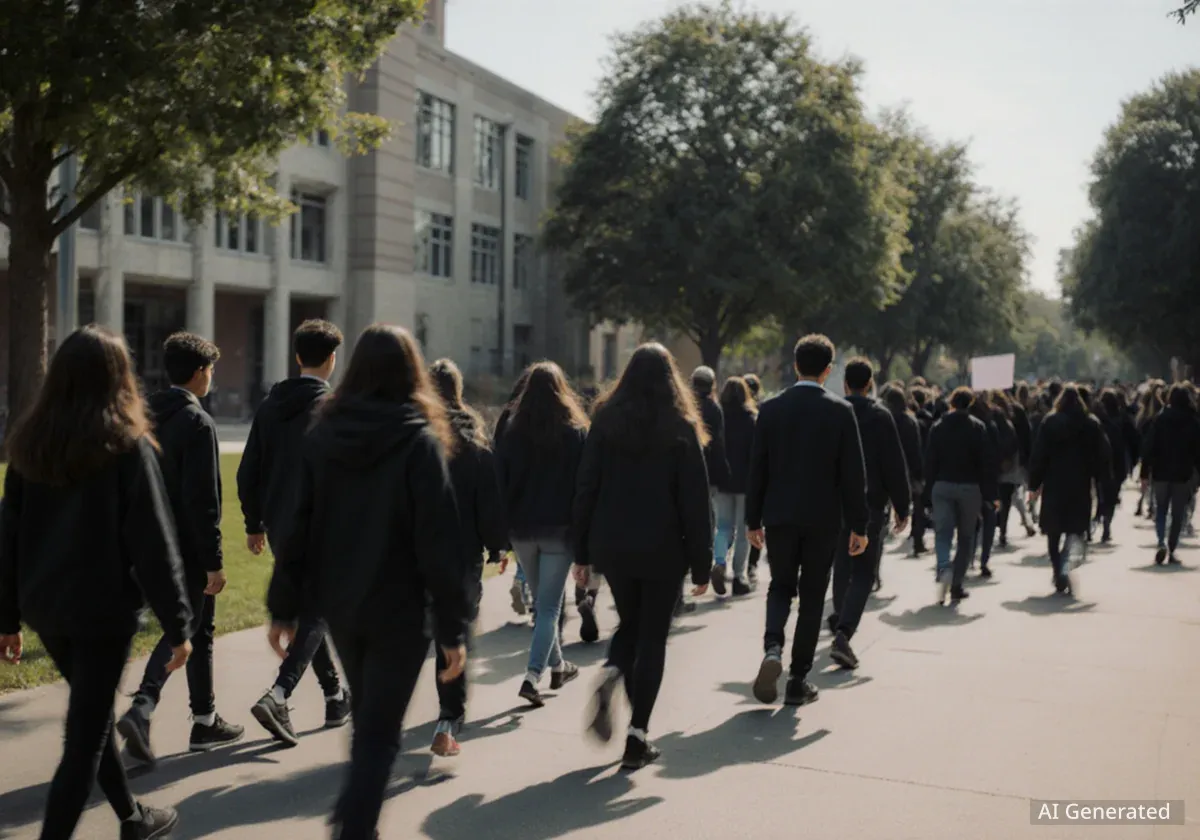Thousands of students across Texas are facing an abrupt and uncertain educational future following the recent end of a 24-year-old state law that granted in-state tuition to residents without legal immigration status. The policy change has resulted in massive tuition hikes, forcing many to reconsider their college plans and navigate a climate of heightened fear over immigration enforcement.
For students like Kevin Zamaripa, a senior in kinesiology at the University of Houston, the financial shock was immediate. His tuition costs are set to jump to approximately $15,000, a sum he will likely have to cover by draining his personal savings. This sudden financial barrier is one of several new challenges creating a perfect storm for Texas's immigrant student population.
Key Takeaways
- The 24-year-old Texas DREAM Act, which allowed undocumented students in-state tuition, has effectively ended.
- Affected students now face out-of-state tuition rates, with costs increasing by thousands of dollars per semester.
- The policy change impacts an estimated 74,000 undocumented students currently enrolled in Texas public universities.
- Students also face challenges from Texas's refusal to issue new DACA work permits and heightened fears of deportation.
A Sudden End to a Landmark Law
In June, state leaders chose not to defend the Texas DREAM Act against a federal complaint, leading to its swift termination. The law, the first of its kind in the nation, had been a critical pathway to higher education for tens of thousands of students at major public institutions, including the University of Texas and Texas A&M systems.
The impact has been immediate and severe. "When I did hear the news of my tuition going up — and when I actually saw my tuition going up — I don't know, I was scared, I was confused," Zamaripa said. "It wasn't until afterward that I was mad, that it happened just to us. I thought it was unfair. I'm just trying to get an education, you know, better myself."
A Triple Threat for Students
Immigrant students in Texas are now grappling with three interconnected challenges:
- Loss of In-State Tuition: The most immediate financial blow, making college unaffordable for many.
- DACA Uncertainty: Texas has sued to end the Deferred Action for Childhood Arrivals (DACA) program and is not required to issue new work permits, limiting students' ability to work legally and qualify for certain scholarships.
- Immigration Enforcement: The Trump administration's pledge to increase deportations has created a pervasive sense of fear among mixed-status families, where some members have legal status and others do not.
Legal experts express concern over the long-term consequences. "For a lot of students, all they're trying to do is get an education and go to college. Now to have it moved from under them, it’s just been really stressful," said Efren Olivares, vice president of litigation and legal strategy at the National Immigration Law Center.
Chaos on Campus
Universities across the state, which enrolled some 74,000 undocumented students as of this summer, have been left to interpret the new reality with little formal direction. The Texas Higher Education Coordinating Board has instructed universities to determine a student's "lawful presence," but the lack of clear guidelines has led to inconsistent application of the new rules.
Barbara Hines, an immigration attorney and founder of the University of Texas Law School Immigration Clinic, noted that many DACA recipients who should still qualify for in-state tuition have been incorrectly denied. This confusion has forced students to drop classes, arrange difficult payment plans, or abandon their studies altogether.
Nearly 675,000 college students in Texas are first- or second-generation immigrants, highlighting the significant role immigrant families play in the state's higher education system.
Support Systems Under Strain
Even before the law ended, support for these students was dwindling. In January 2024, the University of Texas at Austin closed its Monarch Program, which provided scholarships and application support to undocumented and temporary-status students. Now, student-led groups are stepping in to fill the void.
Maximiliano Prado, a representative for the group Students for DEI, said his organization launched a crowdfunding campaign that raised over $10,000 to help students with fall tuition. However, the demand was overwhelming.
"What about right now? What's immediate? People can’t just put their education backwards or wait for the courts to do their thing, because it might take years."
Prado worries that without stable funding and clear policies, thousands of students will be forced to postpone their dreams, impacting not only their lives but also the future workforce of Texas.
A Chilling Effect on Future Generations
The crisis extends beyond current college students, affecting high school seniors who are now reconsidering their plans. College strategist Mayra Valle, who advises first-generation and lower-income students, reported that the number of undocumented students she is helping this year has dropped to zero.
"I think what has shifted is that that trust only goes so far, because we're not talking about getting into college or not at this point, we're talking about family safety," Valle explained. "The stakes are higher."
Fear has permeated the entire college application process. Educators report being advised against giving detailed help on financial aid forms like the FAFSA and TASFA, fearing that families' citizenship information could be compromised. This is especially concerning as the Trump administration has already used tax information to track some immigrants.
The Fear of Family Separation
For students in mixed-status families, the anxiety is constant. Kendra, a Houston City College student whose father is undocumented, lives with the daily fear that he could be deported. President Trump's administration reported approximately 350,000 deportations in the first seven months of his second term.
"Every single day I have to worry about it, and it's only getting worse," she said, asking that her last name be withheld for her family's safety. "Just the feeling of impending doom, like, when is it going to happen?"
These fears are not unfounded. Kendra's family has already discussed contingency plans if her father, who has lived in the U.S. for over two decades, is deported. The disruption would mean the end of her educational journey, which she sees as the culmination of her father's sacrifices.
"My job, my education, that is very significant, not only because I'm going to be successful in the future, but because it has that value of everything he did for me to get here."
As Texas moves forward, the loss of the DREAM Act leaves a void that advocates say will lead to a less diverse and less prosperous state, derailing the ambitions of a generation of students who have only ever known Texas as home.





